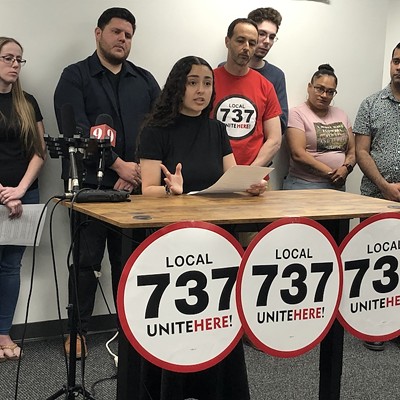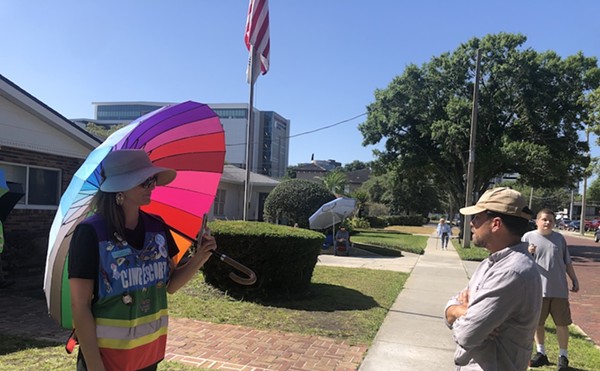It seemed like such a good idea, initially. In 2003, the residents of the Wadeview neighborhood, a quiet community of middle-income, middle-aged homeowners just east of downtown Orlando, gladly signed on for the development of luxury townhouses that would sell for $450,000 a pop on a four-acre lot between East Crystal Lake Street and East Michigan Street. Everyone was thrilled to see the old property — an apartment complex called Tara Oaks that had degenerated into blight and crime — demolished. By 2005, the lot, owned by developer Barry Miller, was platted for the new project by the city.
But then the housing boom went bust, and such an ambitious venture was no longer profitable. Miller built only 17 of the 89 proposed townhouses, and of those only five sold (the dozen left over have now been discounted to $225,000). Enter West Palm Beach developer Jack Weir, who offered to buy the land. Instead of luxury townhouses, Weir proposed building 120 "garden style" apartments. The new project, dubbed Copley Square, would constitute affordable housing targeted to significantly less affluent buyers. The apartments would be eligible for federal tax credits, and the complex's middle-to-lower income residents would have access to after-school care for their children provided by the complex's management company.
Neighbors balked. The opposition's tone was familiar: "Tax-credit housing is inevitably inhabited by long-term unemployed people with multiple children and often absent two parents, resulting in out-of-control juveniles, school dropouts and juvenile crime," read a missive from resident Marti Williams. Everybody has to live somewhere, perhaps, just as long as it's not in my backyard.
The pushback worked. On April 21, the city's the city's Municipal Planning Board unanimously voted against the project, effectively killing it for now.
Longtime Wadeview Neighborhood Association president Randy Tuten, 58, is a retired fire chief who spent 28 years working for the city of Orlando. He's seen how these things go. "I got all the crime reports for the last three years that Tara Oaks was there," he says. "We had prostitution, drugs. It was kids running up and down the street stealing the Christmas lights off our houses. It was just a bad scene." He realizes, however, that talking about this can be a touchy subject. "I'm not saying that all of these young people are bad people," he says. "There's a lot of people out there that just don't make as much money as some of the other people do. … It's not against any race; it's not against people who make any less money. It's just against the density and the capacity, you know, what's compatible with the neighborhood."
"You would not believe the e-mails that I've gotten over this whole thing," he adds. Those e-mails paint a fairly grim picture of incoming welfare recipients, murders and assaults.
The project would have been managed by NuRock, an Atlanta company that has managed similar affordable housing developments throughout the Southeast. Its website shows a video from a segment produced for HGTV featuring predominantly black working families banding together to help each other out in "affordable communities that appear upscale." There are criminal background checks for prospective residents.
"When you're talking about a screening process," counters Tuten, "they'll screen a woman who moves in with three kids, but what about the boyfriend that comes in with four or five felony arrests? And we start having the same problems that we had before."
But these are just small gripes, according to commissioner Phil Diamond, who opposes the development. He cites school overcrowding, density and traffic issues as his main concerns. "I'd like to see something happen there," he says, "but I want it to be something that's consistent with the zoning." (The current zoning allows for 21 dwelling units per acre; this project proposes 25.4 units per acre.)
Miller, who can't sell the property until the city signs off on Weir's proposal, says the Copley Square project has been designed to match community standards and that negotiations with Diamond have gone nowhere; according to Miller, Diamond all but says there's nothing the new developers could do to make this work.
As for the resistance, Miller has his theory. "I'm just so shocked at how exclusive this community is and how people are just showing their prejudices," he says. "It amazes me that in this day and age people can be like this."
[email protected]


















